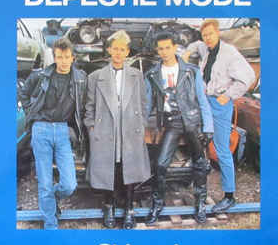Lilian by Depeche Mode Lyrics Meaning – The Enigma of Love’s Pain and Pleasure Unraveled
Lyrics
Oh, Lilian
Look what you’ve done
You’ve stripped my heart
Ripped it apart
In the name of fun
Oh, Lilian
I’m a poor man’s son
And precious jewels
Weren’t found in schools
Where I came from
Pain and misery always hit the spot
Knowing you can’t lose what you haven’t got
Oh, Lilian
I should have run
I should have known
Each dress you own
Is a loaded gun
Oh, Lilian
Ah
Ah
Ah
Oh, Lilian
I need protection
I hear your voice
And any choice I had is gone
Oh, Lilian
Once I begun
I couldn’t stop ’til every drop
Of blood was sung
Pain and misery always hit the spot
Knowing you can’t lose what you haven’t got
Oh, Lilian
Look what you’ve done
You stripped my heart
Ripped it apart
In the name of fun
Oh, Lilian
Ah
Oh, Lilian
Ah
Oh, Lilian
Ah
Oh, Lilian
Ah
Depeche Mode, the iconic synthesizer maestros, have often explored the menagerie of human emotion through their haunting melodies and piercing lyrics. In the satellite song from their eleventh studio album ‘Playing the Angel’, ‘Lilian’ surfaces as a composition steaming with the fervid dance of dichotomous feelings. It is a tapestry woven with the threads of love, loss, addiction, and self-inflicted pain.
The song’s narrative encapsulates a tale of a love affair gone awry, one wrapped in the gossamer of destructiveness and an addiction to suffering. It dabbles in the spectrum of what it means to be enamored by something truly damaging, and the allure of a dangerous affection that holds the power to rip apart the very fabric of sanity. Let’s delve into the dissected heart of ‘Lilian’ and attempt to understand the profound implications nestled between its notes.
Siren’s Call: Love or Destruction?
Upon the first resonant chords, ‘Lilian’ sways with the intensity of a cautionary tale. ‘Look what you’ve done’ is more than a lament—it’s an epitaph for the burial of innocence. Lilian, as a symbolic muse, represents the allure of a love that’s as seductive as it is destructive. The protagonist is drawn to her, knowing well the perils that ensue.
This seduction is not of the flesh alone; it seeps into the emotional and mental realms, depicting a psychological vertigo. Emotions here are not gentle waves but vicious tides that ‘strip the heart’ and ‘rip it apart,’ leaving us with the painful recognition of love’s ability to be both cradling mother and unforgiving tempest.
A Tale of Socioeconomic Disparity
The confession ‘I’m a poor man’s son’ roots the song in a tangible, gritty reality. It’s not merely a struggle of the heart, but also of caste and class. Lilian is a siren, perhaps even a symbol of the privileges the protagonist cannot reach. The fact that ‘precious jewels weren’t found in schools where I came from’ underscores a life devoid of opulence, luxury, and perhaps opportunity—an upbringing that is at a stark contrast to what Lilian represents.
The dichotomy between the protagonist’s world and Lilian’s is marked and unwavering. The jewels could also metaphorically suggest the learned wisdom one gains through harsh life experiences outside the shelter of affluence. There’s beauty in the pain and misery for they are the only genuine possessions of those who ‘haven’t got’ much to begin with.
The Inescapable Addiction
‘Each dress you own is a loaded gun’ – Could Lilian then be a metaphor for addiction in any form? Depeche Mode often masters the art of infusing their songs with multifaceted meanings, and ‘Lilian’ might just be a peephole into the abyss of addictive behavior. Every time Lilian changes her attire, or rather, every time the addictive element changes its face, it’s a reminder of the potential harm, the short cycle from euphoria to desolation.
Such addiction could be substance-induced, but it could also be an emotional dependence—a yearning for a person so ferocious that even when it causes undeniable pain, the protagonist finds himself unable to relinquish his hold. The blood sung is the very essence of his being, dripping away with each encounter.
Unveiling ‘Lilian’s’ Hidden Meaning
Peeling back the layers of ‘Lilian,’ one might discern a cautionary embrace concerning the human inclination towards self-destructive behavior. It could be as much a personal narrative as it is a reflection of a collective experience. The song probes deeper, questioning why pain and misery ‘always hit the spot,’ and revels in the perverse comfort found in predictable suffering.
Why is it that knowing one can’t lose what they don’t possess is a bittersweet relief? ‘Lilian’ doesn’t just appeal to the ear; it appeals to the contemplative side of human nature, to the ones who dance on the knife-edge of toxic relationships and life choices bound by the allure of danger and the known embrace of misery.
Memorable Lines and Lasting Echoes
There’s a hauntingly poetic cadence to the refrain ‘Pain and misery always hit the spot,’ that marks the soul of ‘Lilian.’ This lyric forges a bond with the listeners, evoking a universal fellowship of sorrow. The simplicity of the line masks an ocean of complexity—the fact that humans can covet their pain as a treasure, believing it to be the only thing that truly belongs to them.
The brutal rawness of emotion in other lines like ‘Look what you’ve done, you’ve stripped my heart’ leaves a lasting echo, a phantom ache in the listener’s heart. Depeche Mode crafts a song that becomes almost an anthem for those who have known love’s rougher edges, and yet, paradoxically, it is this understanding of pain that allows for the genuine appreciation of joy, a sentiment deeply embedded within the haunting refrains of ‘Lilian.’








